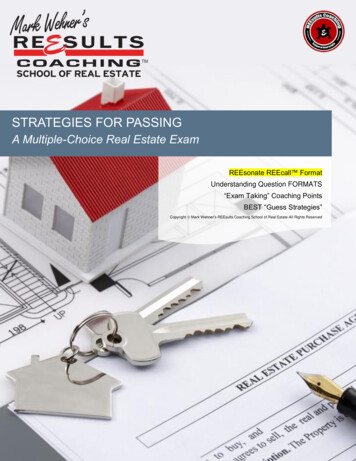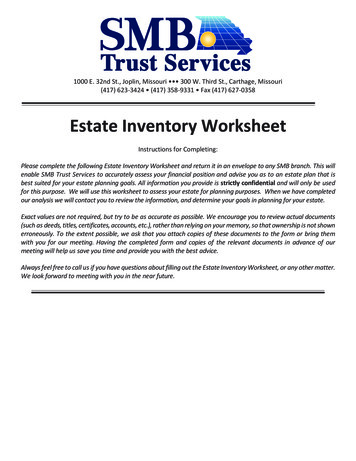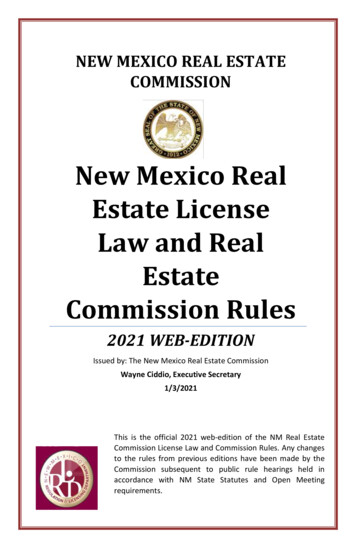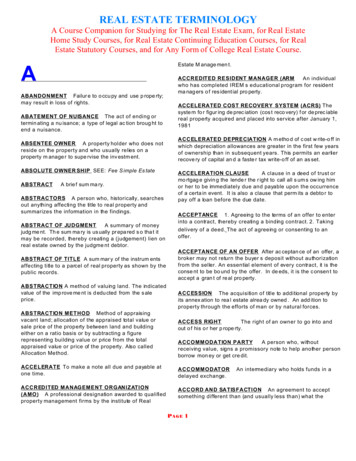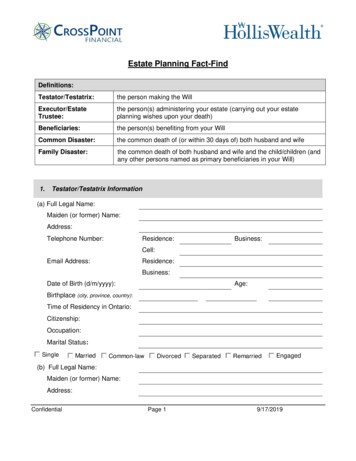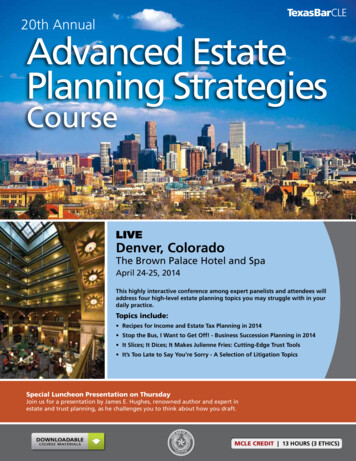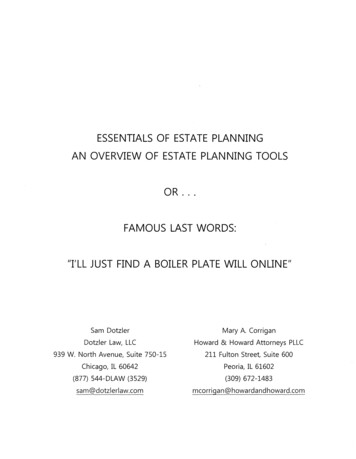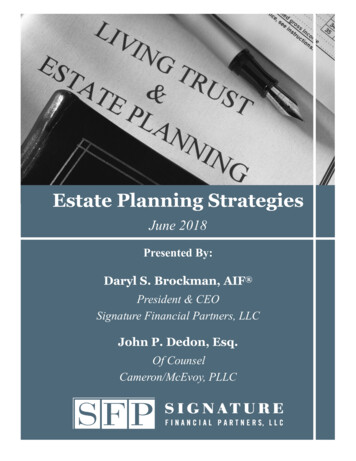
Transcription
Estate Planning StrategiesJune 2018Presented By:Daryl S. Brockman, AIF President & CEOSignature Financial Partners, LLCJohn P. Dedon, Esq.Of CounselCameron/McEvoy, PLLC
Daryl S. Brockman, AIF President and CEOSignature Financial Partners, LLCWith over 28 years of experience in the financial industry, Daryl continues to build a dedicatedteam of experienced and knowledgeable financial professionals prepared to assist clients inachieving their business, individual and family goals through diverse networks and personalrelationships. Daryl’s core practice areas are focused on: 401(k) ManagementEstate Preservation Strategies Executive BenefitsAsset ManagementIn 1995, Daryl became the President and CEO of Signature Financial Partners, LLC and sincethen has grown the company to a top, award winning, nationally recognized firm, winning thecoveted President’s Trophy 7 times (top firm nationally out of 100 at Signator Investors).Daryl works closely with SEIA, LLC (seia.com); a nationally recognized boutique assetmanagement firm in Tyson’s Va, in conjunction with the main office in Los Angeles, California.SEIA has recently surpassed over 6 Billion in assets under management and has consistentlyranked in the Top 15 RIA’s nationally in Barron’s and other financial publications.His credentials include holding the Accredited Investment Fiduciary (AIF ) designation inaddition to multiple securities licenses, he’s an active member of the John Hancock Hall of Fameand was recently recognized in SmartCEO as a Top Money Manager in the Wash DC area.Due to his experience with 401(k)’s, Daryl has been an Adjunct Professor for The Plan SponsorUniversity (TPSU of UCLA) for the Wash DC region. He has also been an active participantwith several industry and charitable organizations including: YPO International, President ofManaging Partner’s Association, Financial Planning Association (FPA), InternationalAssociation of Financial Planning (IAFP), and the Alzheimer’s Association: National Chapter,Charitable Board Member emeritus.Daryl was born in Michigan and graduated from Miami University with a B.S. in Finance and anemphasis in Economics. Upon graduation Daryl relocated to the Great Falls, Virginia area wherehe has lived with his family for the past 25 years. Daryl and his wife, Christina, are proud parentsof their son Alex, attending Wake Forest, and daughter Taylor who attends the Potomac Schoolin McLean, Va. With a passion for sports, Daryl is frequently involved in Great Falls athleticsand often coaches basketball and baseball in his free time. He is also a competitive golfer andmember at the Trump National Golf Club of Washington DC and the Kinloch Golf Club.Virginia Washington D.C. Marylandwww.SFPfinancial.comSecurities and Investment Advisory Services offered through Signator Investors, Inc., Member FINRA, SIPC, aRegistered Investment Advisor. 8607 Westwood Center Drive, 3rd Floor - Vienna, VA22182 180-20170301-353997
Wealth Management for IndividualsFinancial Solutions for BusinessesWHEN WORKING with Signature Financial Partners, LLC our clients benefit from access to a wide rangeof products and services. This is achieved through our open architecture platform and relationshipswith industry leading financial firms, service providers and insurance carriers. Our independentstructure allows for a unique objectivity—our clients always come first—and it is important that youunderstand how we operate with our trusted relationships.We meet with our clients through one-on-one financial counseling sessions, benefit fairs, enrollmentmeetings and phone calls. Not only do we answer pertinent questions regarding their retirement plan,but we encourage open dialogue regarding any financial issue weighing on their mind. With this opencommunication we may be able to provide added guidance as needed. This hi-touch service is part ofthe value we provide to all of our clients.Since 1981 we have been serving the DC area by creating financial strategies for individuals, familiesand businesses. With our personalized approach to helping our clients build, maintain and protecttheir assets, we focus on three key areas of portfolio management:We are supported by thefollowing professionalpartnerships:Signature Investment Advisors (SIA)Signature Investment Advisors is awholly owned subsidiary of SignatureEstate & Investment Advisors, LLC ,which has 6 billion in assets undermanagement as of December 31, 2016.SIA offers investment advisory servicestailored to meet the unique needs ofaffluent individuals and corporations.*CrumpAn insurance brokerage firm providingaccess to products from leadinginsurance carriers.*SIA and its investment advisory services are offered independent of Signator Investo rs, Inc., and any subsidiaries or affiliates. A wholly ownedsubsidiary of Signature Estate & Investment Advisors, LLC.
John P. Dedon, Esq.Of CounselCameron/McEvoy, PLLCWorking in the estate planning, asset protection and business areas for more than 35 years, John helps clientspreserve assets and plan for the future with traditional planning tools, including Trusts (dynasty trusts,intentionally defective trusts, grantor retained annuity trusts), LLC and partnership entities, and cutting- edgeconcepts such as cryonic preservation trusts. John also works extensively in the charitable area, creatingpublic and private charities, remainder and lead trusts, supporting organizations, and churches. John's corepractice areas are focused on: Estate Planning Asset Protection Tax Planning and Controversy Corporate and Business Planning Wealth PreservationJohn was recently included as a Washingtonian Best Lawyer and D.C. area’s “Top Wealth Advisers” inWashingtonian magazine. He was selected by his peers for inclusion in the Best Lawyers of America listingfor 2018 for the sixth consecutive year. He has been listed among Virginia Business magazine’s “LegalElite” numerous times for Taxes, Estates and Trusts. John received an AV Rating, the highest rating givenby Martindale-Hubbell Peer Review Ratings for his legal ability and general ethical standards, in additionto being rated a Martindale-Hubbell Top Rated Estate and Trust Lawyer.John has been quoted extensively in newspapers throughout the country, including the Wall Street Journal,Washington Post, and Chicago Tribune. He has written numerous articles for professional journals andpublications on tax issues and speaks on tax matters and wealth preservation issues for health care providers,certified public accountants, lawyers, financial planners, and the public. He is also the author of the blog,Dedon on Estate Planning, a regularly updated discussion of estate planning topics affecting Virginiaresidents and U.S. citizens. To read John’s blog visit dedononestateplanning.com.John’s publications include: Cautionary Guidance for Operating a Private Foundation, Estate Planningmagazine (2016)Tax Planning and Controversy Integrating Income Taxes in Modern Estate Planning Decisions—A CaseStudy, Tax Management Estate, Gifts and Trusts Journal (2016) Attorney Advises Medical Professionals on Estate Planning (2016)4100 Monument Corner Drive, Suite 420Fairfax, VA 22030703.460.9351 com
DisclaimerThis is an educational and financial analysis tool to assist you by providing concise financial information.This report is a needs analysis of your current situation. It is comprised of separate investment and riskprotection informational segments. There is no fee for this information. It is presented as part of a salespresentation. This material does not constitute tax, legal or accounting advice and is not intended orwritten for such use. Clients interested in these topics should seek advice from an independentprofessional advisor. The sole purpose of this report is to help you make appropriate transactionaldecisions about financial products that may help you meet your goals. The reports and graphics aredependent upon the quality and accuracy of data furnished by you.This analysis is for estimating purposes only and must be reviewed periodically. Past performance is notindicative of future results. Your attorney and accountant should be consulted regarding legal and taximplications. Inclusion of any particular option does not constitute a recommendation of a particularoption over any other planning alternative. Other alternatives may be more appropriate for your particularsituation. Signator Investors Inc. and its affiliates do not guarantee or express an opinion regarding theaccuracy of the system or its content, and will not be liable to any person for any damages arising from theuse or misuse of this content, or from any errors or omissions in the same. This content does not attempt toillustrate the precise legal, tax, accounting, or investment consequences of a particular alternative. Theprecise consequences of a particular alternative depend on many variables, some of which may not beaccounted for or fully described in this content. Unless otherwise indicated, the income tax and generationskipping transfer implications of a particular transaction are not reflected in this analysis.Your own legal and tax advisors should be consulted before you make any estate or business planningdecisions (or change title to any assets or change beneficiary designations) to determine (1) the suitabilityof a particular alternative and (2) the precise legal, tax, investment, and accounting consequences of thatalternative. Signator Investors Inc. and its agents do not give legal, tax or accounting advice. Thispresentation and any other oral or written communications shall not be construed as such.As a result of this Needs Analysis report, Signator Investors Inc. representatives may recommend insuranceor securities products as potential solutions. Clients should carefully review their client data, as summariesbased on inaccurate assumptions may impact the analysis results. All growth rates are hypothetical, notguaranteed. This analysis should be used for estimating purposes only. Past performance is not indicativeof future results. Your attorney and accountant should be consulted regarding legal and tax implications. Acurrent prospectus must be read carefully when considering any investment in securities.No liability is assumed from the use of the information contained in this analysis. Responsibility forfinancial decisions is assumed by you. It is important to revise your strategies periodically in light of yourexperiences and changing goals.Securities are offered through Signator Investors, Inc., Member FINRA, SIPC, 380 Stuart Street, Boston, MA02116Presented by Daryl Brockman
Key Estate Planning ConsiderationsAlthough Congressional action in the last few years has effectively eliminated federal estateand gift taxes for all but the wealthiest Americans, there is still a vital need to do estateplanning.Why? There are several key reasons: (1) to be sure that all of your wishes are followed afterdeath; (2) to plan for state inheritance or estate taxes, if you live (or own property) in a statewhich levies such a tax; and (3) to plan in advance how to pay for any estate settlement costs.Federal estate tax law may have changed, but estate planning still matters.Transfer of AssetsA primary objective is to insure that your assets go to those you want to receive them.MethodDescriptionWillConsidered a key element in any estate plan, a will is a legal document, prepared understate law, which names those who should receive your property. An "executor" isgenerally named in the will to carry out your wishes. After death, "probate" will berequired, a process in which the property listed in the will is distributed to the namedheirs under court supervision. Unfortunately, the probate process is frequently expensiveand time-consuming, and generally makes the contents of a will a public record. If youdie without a will (termed "intestate"), your property will be distributed according to statelaw, which may result in your assets being distributed in a manner not in accordance withyour wishes.Revocable TrustAlso known as a "living" trust, a revocable trust can be changed or revoked during thelifetime of the trust creator (the "granter," "settlor," or "trustor"). Such a trust is oftenused as a will substitute, when the grantor transfers assets into the trust during life or atdeath through a "pour-over" will. A revocable trust can make settling a decedent's estateeasier and less expensive than probating a will and can also provide privacy not availablein probate.IrrevocableTrustAn irrevocable trust - as the name implies - cannot be changed once it is set up. Thesetrusts are often used in estate planning for wealthy individuals. An irrevocable trustwhich holds life insurance can provide the funds needed to pay death taxes and otherestate settlement expenses, while keeping the life insurance proceeds outside of thetaxable estate.Presented by Daryl Brockman
Key Estate Planning ConsiderationsMethodDescriptionJoint TenancyAssets held in joint tenancy pass automatically at the time of death to the surviving jointowner, if living. In community property states, community property with right ofsurvivorship has the same result. How ownership of an asset is "titled" can be important.BeneficiaryDesignationsSome assets, such as life insurance policies, qualified retirement plans, and IRAs allow theowner to name a "beneficiary." At death, the policy death benefit or title to the assetautomatically passes to the named beneficiary or beneficiaries. In some states,"Transfer-on-Death," (TOD) and "Pay-on-Death" (POD) allow certain types of property toautomatically pass to named beneficiaries upon the death of the owner. Properbeneficiary designations are essential to make sure the assets pass according to yourwishes.Planning for Estate Transfer CostsIf proper prior planning is not done, estate and inheritance taxes, legal fees, and other estatesettlement expenses can significantly reduce the legacy passing to your intended heirs.Planning for estate settlement costs: Making maximum use of non-probate transfermethods such as revocable trusts, joint tenancy, community property with right ofsurvivorship, or named beneficiaries, can help limit estate settlement costs and avoid thedelay of probate.Planning for estate taxes: 1 If the dollar value of an estate is large enough to be subject toestate and/or inheritance taxes, these taxes can add appreciably to transfer costs. In 2018, anestate with a net value of 11,180,0002 or less is exempt from federal estate tax. This federalestate tax threshold is also known as the "applicable exclusion amount." However, moststates with an estate or inheritance tax have estate tax thresholds which are considerablylower. Thus, an estate which has no federal estate tax liability could easily be subject to statedeath taxes.Under federal estate tax law there are a number of ways to shrink the taxable estate: Lifetime gifts: each individual has an annual gift tax exclusion, currently 15,0002 perperson per year, generally allowing for tax-free gifts to others.1 The discussion here primarily concerns federal law; state or local law may differ.2 2018 value. This amount is subject to adjustment for inflation in future years.Presented by Daryl Brockman
Key Estate Planning Considerations Marital deduction: spouses who are both U.S. citizens can gift any amount to eachother, generally with no estate or gift tax consequences. The survivor's now largerestate could face a greater estate tax problem when he or she later dies. Charitable giving: gifts to charities, during life or at death, reduce the estate size. Bypass trust: A type of trust known as a "bypass" trust allows the first-to-die of amarried couple to set aside a portion of his or her assets. In years before 2011, suchtrusts were used in an effort not to "waste" the first-to-die's applicable exclusionamount. With the applicable exclusion amount currently set at a very high level, plusthe introduction in 2011 of the "Deceased Spousal Unused Exclusion" (see below), forfederal estate tax purposes at least, the bypass trust is less useful than before. Whenplanning for state death taxes, however, often with much lower taxability thresholds,the bypass trust remains a useful estate planning tool.1 Deceased spouse unused exclusion (DSUE): Beginning in 2011, a change in federalestate tax law provided that any portion of the applicable exclusion amount thatremained unused at the death of a spouse could be held over and made available foruse by the surviving spouse, in addition to the surviving spouse's own applicableexclusion amount. This "portability" opened up new planning opportunities that didnot exist under prior law.Paying estate settlement costs: While careful planning can help reduce estate settlementexpenses, the planning process also needs to consider how to pay for the costs that doremain. There may be a need for funds to sustain the family until the estate is settled, to payoff debt or otherwise provide for the surviving spouse or children. An estate will often need tosell assets to raise the needed cash. While some assets are relatively liquid, others may takemonths or even years to be sold. Working with your investment advisor, you may need torearrange some of your assets to provide increased liquidity to your estate. If there arecurrently not enough liquid assets in the estate, consider life insurance as a way to providethe needed funds.Caring for SurvivorsYour survivors - a spouse, minor children, or a disabled child of any age - must also beconsidered in the estate plan.1 There may also be other, non-tax reasons, for including a bypass trust in an estate plan.Presented by Daryl Brockman
Key Estate Planning ConsiderationsA guardian for dependents: In case both parents are deceased, a guardian (and one or morealternates) should be named to care for minor children or other dependents.Asset management: Professional asset management may be necessary to insure thatfinancial resources are not squandered.Who Makes Medical Decisions When I Cannot?Modern medicine can now keep someone "alive" in situations that formerly would haveresulted in death. Those who do not wish to have their lives artificially prolonged by suchtechniques must plan ahead and put their wishes in writing:"Living Will": Also known as a "Directive to Physicians", this document provides guidance asto the type of medical treatment to be provided or withheld and the general circumstancesunder which the directive applies.Durable power of attorney for health care: Many states have laws allowing a person toappoint someone to make health care decisions for them if they become unable to do so forthemselves.Durable power of attorney for financial affairs: Allows another individual to act on yourbehalf with regard to financial matters in the event of incapacity.Outside the Legal FrameworkMost of the documents involved in an estate plan are legal in nature and should be preparedby an attorney. However, not all documents involved in an estate plan are legal ones:Letter of Instructions: A "Letter of Instructions" is an informal document that can includeinformation such as your wishes regarding disposition of your remains, contact informationfor key advisors and family members, the location of important documents, the descriptionand location of assets, user names and passwords for online accounts, or notes on familyhistory. It is used to provide, in a private manner, direction and guidance to your family orexecutor in settling your estate.Ethical Will: While a legal will or a trust is used to distribute assets, an "Ethical Will" serves totransfer values and beliefs. It is a very personal expression of the writer's life and values asPresented by Daryl Brockman
Key Estate Planning Considerationswell as the people, events, and experiences that influenced that life. In a very real sense, anethical will is a spiritual legacy to future generations.Seek Professional GuidanceAlthough an estate plan can be as simple as a set of hand-written instructions, there are anumber of situations where legal guidance is considered vital:To create a will or trust: An experienced attorney, familiar with local law, can prepare thelegal documents required to meet the needs of your individual situation.Estate taxes: If your estate is large enough to be subject to estate tax, your attorney cansuggest ways to lighten the tax burden.Squabbling heirs: Planning may be needed to minimize potential conflicts between yourheirs or beneficiaries. Such disputes can occur when siblings don't get along or there arechildren from more than one marriage.Property elsewhere: If you own property in more than one state or country, there may be aneed for an ancillary probate. Living trusts are often used to transfer these assets and avoidthe additional probate.In addition to your attorney, your estate planning "team" will likely include experts fromother disciplines such as income tax, life insurance, trust administration, charitable giving,and investment management. The professional guidance provided by such advisors is a keypart of creating and implementing a successful estate plan.Periodic ReviewBecause tax law and personal lives are never static, don't just put your estate plan in a drawerand forget about it. Many financial professionals recommend a periodic estate plan review.Presented by Daryl Brockman
Various EstatePlanning ArrangenientsA Summary of neficiaries of estate,NoYesYesYesGuardians for children, andNoYesYesNoNoBenefits1. Allows you to select:a.b. Executor of will,c.d.Trustees of trust.2. Avoids probate costs.33.Provides asset management forchildren over age 18.4.Protects estate owner from aconservatorship.s. Designed to save death taxes forcouples.6. Allows the first spouse to die todetermine the ultimatebeneficiaries of the estate inexcess of 11,180,0005, whilestill deferring the death taxes. -NoYesNoNoNoBypasswithLivingTrustBypass,QTIP, 1 oMaybe4NoYesYesNoYesNoNo--No--Yes1 QTIP stands for qualified terminable interest property trust.2 Each living trust is generally accompanied by a "pour over" type of will which picks up assets not put into the trust duringlifetime and transfers them after death. Executors/guardians are named in a will.3 If all of the assets are in the living trust, probate is not necessary. However, there will usually be some expense for legaladvice or the transfer of assets not in the trust. Without a trust, probate costs may exceed 5% of the total estate.4 Some trust wills contain bypass trusts designed to save death taxes, while others merely manage assets.5 The applicable exclusion amount is the dollar value of assets protected from federal estate tax by an individual's applicablecredit amount. For 2018, the applicable exclusion amount is 11,180,000. In 2017, the applicable exclusion amount was 5,490,000.Presented by Daryl Brockman
Various Estate Planning ArrangementsBrief Description of Arrangement No will: Your estate passes to heirs picked by the legislature. Basic will: Generally passes everything to your spouse, if living, otherwise to yourchildren when they reach age 18. Trust will: May contain bypass and QTIP trusts or may pass everything to your spouse,if living, otherwise for children. Basic living trust: Designed to avoid probate and provide asset management. Usedfor smaller estates and single persons. Bypass with living trust: Designed to set aside assets for specific heirs while givingthe surviving spouse income and flexibility. Appreciation on assets inside the trust canavoid estate tax. Bypass and QTIP with living trust: Same as the bypass with living trust, plus it givesthe first spouse to die more control over who will eventually receive his or her assetsafter the surviving spouse dies. Also called a QTIP trust.Presented by Daryl Brockman
The Federal Estate TaxAn Overview for 2018The federal estate tax is an excise tax on the right to transfer property after death. The grossestate includes the fair market value of all assets owned by the decedent as of the date ofdeath, including retirement plans and life insurance policies. When the taxable portion of anestate reaches 1,000,000, it enters the top estate tax bracket of 40%.The tax applies only to taxable estates in 2018 that exceed the applicable exclusion amount of 11,180,000.1Transfers between spouses generally qualify for the unlimited marital deduction and are freeof current tax.The estate tax return (Form 706) and any taxes due are generally payable nine months afterdate of death. In some situations, a portion of the taxes may be paid to the IRS ininstallments.If the value of the estate assets declines during the first six months after death (which oftenhappens if the decedent owned a business), the value (for all assets) as of six months afterdeath may be used on the tax return.Lifetime gifts that exceed the annual gift tax exclusion (In 2018, 15,000 per donee per year)will also reduce the estate owner's applicable credit amount.Some transfers made during one's lifetime may be brought back into the decedent's estate. Afew examples are listed below: Gifts of life insurance policies within three years prior to death. Transfer of an asset from which the donor retains an income for his or her life. Transfer of an asset where donor retains the right to alter or terminate the transfer. Assets placed in joint tenancy with another are included in the gross estate.1 The applicable exclusion amount is the dollar value of assets protected from federal estate tax by an individual's applicablecredit amount. For 2018, the applicable exclusion amount is 11,180,000. In 2017, the applicable exclusion amount was 5,490,000.Presented by Daryl Brockman
How the Federal Estate Tax WorksA Simplified Illustration1. DETERMINE THE GROSS ESTATE.2. SUBTRACT THE DEDUCTIONS.Total the fair market value of all assetsthe decedent owned:Certain items may be deducted todetermine the taxable estate amount: Residence, real estate. Assets passing to surviving spouse. Business interests, stocks, bonds,retirement accounts. Debts of the decedent. Probate and burial expenses. Life insurance, personal property, etc. Bequests to charities, etc. State death taxes.3. CALCULATE THE TAX.4. TAKE APPLICABLE CREDITS.Using the taxable estate amount,calculate the federal estate tax.Graduated tax rates are used, with thehighest marginal rate in 2018 being 40%.For assets passing to someone otherthan a spouse, reduce the tax by theapplicable credit amount.Other credits may apply.5. PAY THE TAX.After subtracting the credits, any remaining tax is due nine months after death - in cash.Due in CashPresented by Daryl Brockman
Federal Estate Tax WorksheetAssumes Death Occurs During 2018A. Fair market value of real estate and business property B. Fair market value of investments, stocks, bonds, funds, etc.C. Fair market value of personal and other propertyD. Gross estate (sum of items A, B and C)E. Administration expenses (funeral expenses, etc.)F. Debts of decedentG. Marital deduction (assets to spouse)H. Charitable deduction (bequests to charity)I. State death taxesJ. Total deductions (sum of items E through I)K. Taxable estate (item D minus item J)L. Adjusted taxable gifts (gifts made during life)M. Estate tax base amount (sum of items K and L)N. Gross estate tax (on item M from table below)0. Applicable credit (maximum of 4,417,800) 1P. Gift taxes paid on lifetime giftsQ. Total credits (sum of items O and P)R. Net federal estate tax (item N minus item Q)1 In 2018, the applicable credit may exceed 4,417,800 (up to a maximum of 8,835,600) if there is a "deceased spousalunused exclusion amount" available.Presented by Daryl Brockman
Valuation of Estate AssetsAssets belonging to the deceased estate owner are included in his or her estate at their fairmarket value on the date of death or, if the executor elects, their value six months after dateof death.1A Few Selected AssetsType of AssetsHow Asset Is ValuedReferenceListed stocks andbonds (including overthe counter)The mean between highest and lowest quotedselling prices on the valuation date.Reg. Sec. 20.2031-2(b)(l)Mutual fundsValued at their bid price or redemption value (i.e.,the amount the fund would pay the shareholder if itredeemed the shares on the valuation date).Regs. Secs. 20.2031-8 (b)and 25. 2512-6(b);U.S. vs. Cartwright,411 U.S. 546 (1973)Survivor's annuity(under a joint andsurvivor annuitycontract)The amount that the same insurance companywould require for a single life annuity on thesurvivor, as of the applicable valuation date.Reg. Sec. 20.2031-8Close corporationstockFair market value is based on history and nature ofbusiness, economic outlook, book value, earningcapacity, dividend paying capacity, goodwill, recentsales of stock and similar publicly traded companystock.Rev. Rul. 59-60, 1959-1 CB237Real estateFair market value of real estate in the United Statesor in a foreign country.IRC Secs. 2031, 2032A, 2033Real estate (farm orcorporate owned)Value may be determined by actual use rather thanon its highest and best use if certain conditions aremet.IRC Sec. 2032AMortgages and notesThe amount of the unpaid principal plus accruedinterest, unless a lower value can be proven (i.e., aninsolvent debtor).Reg. Sec. 20.2031-41 "Six months after date of death" is referred to as the "alternate valuation date." Use of the alternate valuation date electionmust reduce both the value of the gross estate and the federal estate tax liability. If this election is made, assets sold ordistributed during the six-month period are valued at the date of sale or distribution. Under proposed regulations,generally effective for decedents
Signature Investment Advisors (SIA) Signature Investment Advisors is a wholly owned subsidiary of Signature Estate & Investment Advisors, LLC , which has 6 billion in assets under management as of December 31, 2016. SIA offers investment advisory services tailored to meet the unique needs of affluent individuals and corporations.* Crump
